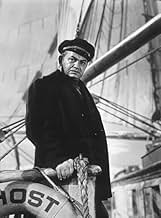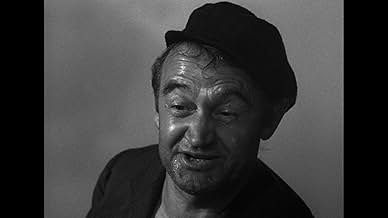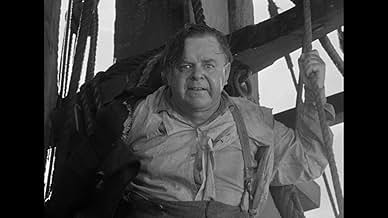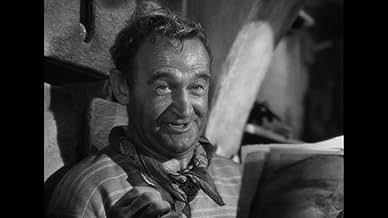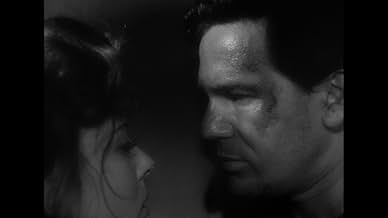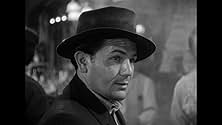IMDb RATING
7.5/10
4.8K
YOUR RATING
After being fished out of the sea by a sailing ship, three fugitives find themselves prisoners of the ship's brutal skipper who refuses to put them ashore, and they hatch an escape plan duri... Read allAfter being fished out of the sea by a sailing ship, three fugitives find themselves prisoners of the ship's brutal skipper who refuses to put them ashore, and they hatch an escape plan during a crew mutiny.After being fished out of the sea by a sailing ship, three fugitives find themselves prisoners of the ship's brutal skipper who refuses to put them ashore, and they hatch an escape plan during a crew mutiny.
- Nominated for 1 Oscar
- 2 nominations total
Ernie Adams
- Pickpocket
- (uncredited)
Cliff Clark
- First Detective
- (uncredited)
Jeane Cowan
- Singer
- (uncredited)
Richard Cramer
- Bartender
- (uncredited)
William Gould
- Second Detective
- (uncredited)
Ralf Harolde
- Agent Getting Johnson Shanghaied
- (uncredited)
Oscar 'Dutch' Hendrian
- Crewman
- (uncredited)
- Director
- Writers
- All cast & crew
- Production, box office & more at IMDbPro
Featured reviews
One of the great classics Directed by the gifted tyrant Micheal Curtiz. Every performance is excellent with Edward G. giving one of his best. Curtiz did not make boring films, this speeds along at under 90 minutes without a dull moment. The miniature work is even good, note the scene near the beginning with the row boat in the bay. That is a miniature in a tank but pretty damn convincing. Flawless and gripping.
This is probably the best remembered version of the Jack London tale. A ruthless and savvy sea captain(Edward G. Robinson)reluctantly rescues a shipwreck and puts his unplanned passengers to work on his ship. Soon he is forced to deal with an enraged, rebellious crew. Directed expertly by Michael Curtiz.
Robinson is great as the meglomaniacal master of the ship. Outstanding performances from Ida Lupino and John Garfield. Also in supporting roles are Howard Da Silva, Barry Fitzgerald and Alexander Knox. Watch this in tandem with another Curtiz swashbuckler SEA HAWK(1940)along with popcorn shrimp and dramamine...talk about adventure.
Robinson is great as the meglomaniacal master of the ship. Outstanding performances from Ida Lupino and John Garfield. Also in supporting roles are Howard Da Silva, Barry Fitzgerald and Alexander Knox. Watch this in tandem with another Curtiz swashbuckler SEA HAWK(1940)along with popcorn shrimp and dramamine...talk about adventure.
"I've spit in the eye of better men than you for saying less", boatswain John Garfield snarls at sadistic captain Edward G. Robinson in this gritty film noir, set in the open sea, but fenced in, very noir-like, by constant dense fog.
I believe Raoul Walsh would have made a more dynamic film over Jack London's novel than Michael Curtiz did, but it is still a pretty good watch any day of the week. Robert Rossen wrote the screenplay which is well-structured, but far too literal and talkative for the pacing of a dramatic work of art. The lighting of the set, basically just the ship 'The Ghost', is brilliant, Erich Wolfgang Korngold's score must count among his best, highly effective and evocative.
Acting is on a very high level, with Robinson grabbing a first prize for his portrayal of the complex sadist 'Wolf' Larson. John Garfield is his swarthy and sexy adversary, and Barry Fitzgerald turns his signature role of the Irish leprechaun on its head with his vicious, diabolical snitch of a sailor, truly scary, a virtuoso performance.
I believe Raoul Walsh would have made a more dynamic film over Jack London's novel than Michael Curtiz did, but it is still a pretty good watch any day of the week. Robert Rossen wrote the screenplay which is well-structured, but far too literal and talkative for the pacing of a dramatic work of art. The lighting of the set, basically just the ship 'The Ghost', is brilliant, Erich Wolfgang Korngold's score must count among his best, highly effective and evocative.
Acting is on a very high level, with Robinson grabbing a first prize for his portrayal of the complex sadist 'Wolf' Larson. John Garfield is his swarthy and sexy adversary, and Barry Fitzgerald turns his signature role of the Irish leprechaun on its head with his vicious, diabolical snitch of a sailor, truly scary, a virtuoso performance.
Edward G. Robinson puts his own brand of cruelty on the role of a freighter captain who tyrannizes his crew and some unexpected passengers (Ida Lupino, John Garfield, Alexander Knox) in this taut, suspenseful psychological melodrama with no shortage of brooding atmosphere.
Based on the famous Jack London story of Wolf Larsen (Robinson), the callous and inhuman skipper of a schooner, who proceeds to make life hell for his crew and his unwilling passengers rescued from a sinking ferryboat. Lupino and Garfield are a couple of losers with a past; Knox is a mild-mannered novelist. The romantic angle between Garfield and Ida is underplayed with the accent more on the brooding tension aboard the schooner.
Under Michael Curtiz' direction, all the performances are first-rate and Erich Wolfgang Korngold's intriguing score helps sustain the tense mood of passengers adrift on a fog-shrouded sea. Alexander Knox's restrained portrayal of an intellectual is a perfect foil for Robinson's bombastic megalomaniac skipper. Stand-outs in the large supporting cast are Gene Lockhart as a nervous, cowardly doctor and Barry Fitzgerald as a crafty cook, a sinister departure from his usual comic roles.
Absorbing all the way, well worth viewing, this represented a step up the ladder for Ida Lupino's career at Warner Bros. Watch for my full-length career article on Ida Lupino scheduled to appear in an upcoming issue of FILMS OF THE GOLDEN AGE.
Based on the famous Jack London story of Wolf Larsen (Robinson), the callous and inhuman skipper of a schooner, who proceeds to make life hell for his crew and his unwilling passengers rescued from a sinking ferryboat. Lupino and Garfield are a couple of losers with a past; Knox is a mild-mannered novelist. The romantic angle between Garfield and Ida is underplayed with the accent more on the brooding tension aboard the schooner.
Under Michael Curtiz' direction, all the performances are first-rate and Erich Wolfgang Korngold's intriguing score helps sustain the tense mood of passengers adrift on a fog-shrouded sea. Alexander Knox's restrained portrayal of an intellectual is a perfect foil for Robinson's bombastic megalomaniac skipper. Stand-outs in the large supporting cast are Gene Lockhart as a nervous, cowardly doctor and Barry Fitzgerald as a crafty cook, a sinister departure from his usual comic roles.
Absorbing all the way, well worth viewing, this represented a step up the ladder for Ida Lupino's career at Warner Bros. Watch for my full-length career article on Ida Lupino scheduled to appear in an upcoming issue of FILMS OF THE GOLDEN AGE.
The London classic has been filmed many times, but never better than here. It's Warner Bros. operating on all 8 cylinders, from casting, to directing, to art department and special effects. So who better to play the maniacal captain than Edward G, Robinson at his snarling prime, or the rebellious ex-con than John Garfield at his defiant prime, or the downtrodden girl than Ida Lupino at her soulful prime. Together they're a dynamite cast, and even the snobbish Alexander Knox manages his literary role in fairly sympathetic fashion. It's atmospheric the whole way with the aptly named Ghost slipping through one fog bank after another.
The Robert Rossen adaptation is less philosophical than others. Robinson's Wolf Larson acts more out of psychological compulsion than philosophical principle. His battle of wits with Knox's Humphrey van Weyden is more about Freudian ego than the merits of a Nietschean superman. Larson desires power to prove his own self and not to prove a larger point about ruthlessness and the struggle to survive. I suspect that had the movie been made a few years later, Hitlerian comparisons would have been drawn. Then too, when there's talk of the ship's "downtrodden" crew being freed at last, it's likely the leftish Rossen has more than a ship's crew in mind. Too bad that the commanding Howard deSilva doesn't have a larger role which would have made the outlaw ship even more hellish.
Note the informal wedding vows exchanged between Lupino and Garfield at movie's end. The lines are rather clumsy and out-of-step with the rest of the script. I suspect the censors required some such vows before the couple were allowed to live together on a deserted island after leaving the ship. Even though this seems a reach, I gather censorship concerns could indeed reach to such an implied level. Be that as it may, the Robinson performance is powerfully riveting and not to be missed. All in all, the movie remains a fine example of ensemble film-making and a tribute to Hollywood's old studio system.
The Robert Rossen adaptation is less philosophical than others. Robinson's Wolf Larson acts more out of psychological compulsion than philosophical principle. His battle of wits with Knox's Humphrey van Weyden is more about Freudian ego than the merits of a Nietschean superman. Larson desires power to prove his own self and not to prove a larger point about ruthlessness and the struggle to survive. I suspect that had the movie been made a few years later, Hitlerian comparisons would have been drawn. Then too, when there's talk of the ship's "downtrodden" crew being freed at last, it's likely the leftish Rossen has more than a ship's crew in mind. Too bad that the commanding Howard deSilva doesn't have a larger role which would have made the outlaw ship even more hellish.
Note the informal wedding vows exchanged between Lupino and Garfield at movie's end. The lines are rather clumsy and out-of-step with the rest of the script. I suspect the censors required some such vows before the couple were allowed to live together on a deserted island after leaving the ship. Even though this seems a reach, I gather censorship concerns could indeed reach to such an implied level. Be that as it may, the Robinson performance is powerfully riveting and not to be missed. All in all, the movie remains a fine example of ensemble film-making and a tribute to Hollywood's old studio system.
Did you know
- TriviaThe first movie to have its world premiere on a ship: the luxury liner "America", during a trip from San Francisco to Los Angeles.
- GoofsUntil the era of the 1st World War, the practice on board a ship was to call orders for the helmsman to move the tiller either to port or to starboard. Calling "hard a-port" meant moving the tiller to port, which means the rudder and the vessel, will then move to starboard. With wheel steering, putting the helm/tiller to port, means spinning the wheel to starboard. Ships no longer use this system - these days helm directions refer to the desired turn of the rudder/vessel. The James Cameron movie "Titanic" also contained a similar scene, which generated a lot of puzzlement. It IS a bit confusing at first, unless one is a sailor and is familiar with tiller steering.
- Quotes
Humphrey Van Weyden: There's a price no man will pay for living.
- Alternate versionsThe film was cut by approximately 12 minutes down to less than 90 minutes for re-issue. The deleted footage consisted of little, but integral, moments throughout the story which added considerably to the quality of the film as a whole. For many years, the only known existing print of the original 99-minute theatrical version was a 16mm print which belonged to the film's star, John Garfield. However, Warner Brothers studio recently discovered a 35mm print of this original version at the Museum of Modern Art in New York City. It was subsequently restored and used for distribution on DVD and Blu Ray.
- ConnectionsEdited into The Sea Wolf (1993)
- SoundtracksHello! Ma Baby
(uncredited)
Music by Joseph E. Howard
Lyrics by Ida Emerson
Played on piano and sung by Jeane Cowan in the bar
Details
Box office
- Budget
- $1,013,217 (estimated)
- Gross worldwide
- $6,192
- Runtime
- 1h 40m(100 min)
- Color
- Aspect ratio
- 1.37 : 1
Contribute to this page
Suggest an edit or add missing content


